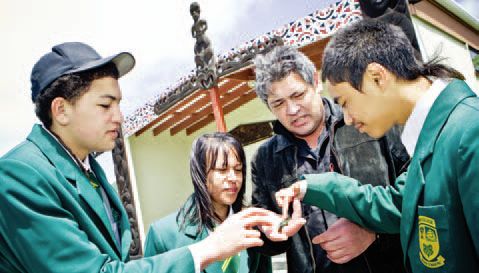Participation
Participation is about equality of opportunity and outcomes. Students need to learn how to participate and contribute as active citizens through opportunities to explore and appreciate the rich and diverse cultures, languages, and heritages that shape their identities as New Zealanders. Informed civic participation is a key aspect of the New Zealand Curriculum’s future focus principle.
Participation also emphasises positive Māori involvement at all levels of education, as expressed in NEG 9:
Increased participation and success by Māori through the advancement of Māori educational initiatives, including education in Te Reo Māori, consistent with the principles of the Treaty of Waitangi.
When this principle is realised, the aspirations and views of Māori students, and of their parents, whānau, and communities are apparent in school and classroom planning (ERO, 2011).
Guiding questions - He pātai
- What does partnership mean at your school? What leadership roles do different partners take? How could this be enhanced?
- To what extent are the identity, language, and culture of Māori students evident in teaching and learning experiences at your school?
- What does “genuine participation” look like for Māori members of your school community?
- What opportunities do Māori have to share their knowledge and expertise within your school curriculum?
Helpful resources
Websites
- UNESCO’s Treaty of Waitangi web resource
Publications
O’Malley, V., Stirling, B., and Penetitio, W. (2010). The Treaty of Waitangi Companion: Māori and Pākehā from Tasman to Today. Auckland: Auckland University Press.
Rangiātea: Western Springs College
The Rangiātea project’s case study on Western Springs College describes the school’s deep commitment to the Treaty of Waitangi. One way in which this is communicated to staff is in the school’s appraisal policy, which sets out specific requirements with regard to teachers’ competency in te reo Māori me ōna tikanga and their obligations in upholding the Treaty. School policy is translated into departmental policy; for example, the maths department’s scheme of work emphasises the Treaty and details teachers’ obligations to Māori students and whānau. The rumaki (Māori-immersion unit) has a powerful role in ensuring these commitments are enacted in practice across the school, with rumaki kaiako helping to build mainstream teachers’ understandings of te reo Māori me ōna tikanga as well as educational issues and policies related to Māori.
The case study materials provide considerable evidence of whānau satisfaction with the quality of the home–school relationship. There is an especially close relationship with the rumaki whānau, but mainstream Māori whānau are also consulted on new developments, particularly through whānau hui that are held once a term and through representation on the board of trustees. As part of the school’s commitment to honour the spirit of partnership symbolised by the Treaty, the principal ensures that majority decision-making does not override Māori viewpoints.
Western Springs College works to maximise educational success for all students through focusing on their learning and building strong relationships with students, parents, and whānau. Its success in achieving these goals is reflected in the outcomes for students, including the participation of Māori students in the senior school:
Students are able to retain a pathway to year 13 stats or calculus. There is an extremely high percentage of year 12 and year 13 students opting in to maths courses. Over 90 percent of Māori students take maths through to year 13.
Ken Havill, Principal
This case study is based on a full study and exemplar developed by the Rangiātea project. (Read case studies and exemplars for the Rangiātea schools.)

